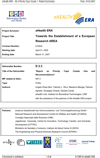 The report analyses the current state of developing electronic patient summaries in European Union Member States and beyond. It highlights the benefits of such summaries and also the difficulties that need to be overcome to make use of patient summaries in different countries.
The report analyses the current state of developing electronic patient summaries in European Union Member States and beyond. It highlights the benefits of such summaries and also the difficulties that need to be overcome to make use of patient summaries in different countries.
Patient Summaries are a key component for eHealth roadmaps in several countries.
The concept of a Patient Summary is not yet universal and fixed, and thus the features of the summaries largely depend on the eHealth programme in which they are embedded. The overall scenarios for deployment of Patient Summaries depend on strategic decisions in each national and regional jurisdiction, which influence the format and the usage of clinical documents.
Besides Patient Summaries, most eHealth programmes also involve various kinds of clinical documents in electronic formats, such as prescriptions and diagnostic reports. A precondition for the success of patient summaries is the deployment of suitable infrastructures to identify citizens and professionals, to make available repositories and registries for the management of clinical documents across healthcare facilities, and to apply confidentiality measures.
All results will consecutively be made available at the eHealth ERA website (www.ehealth-era.org).
The report is the outcome of research in the context of eHealth ERA, which is implemented by empirica GmbH (co-ordinating partner, Germany), STAKES (Finland), CITTRU (Poland), ISC III (Spain), CNR (Italy) and EPSRC (United Kingdom), based on a Coordination Action contract with the European Commission.
Download "Analysis of the situation of electronic patient summaries in European Union Member States and beyond" eHealth ERA Report(.pdf, 308 KB)
For further information:
ICT for Health
European Commission - Information society and Media DG
Office: BU31 06/73 B-1049 Brussels
Email: This email address is being protected from spambots. You need JavaScript enabled to view it.
Tel: +32 2 296 41 94
Fax: +32 2 296 01 81
http://europa.eu/information_society/eHealth